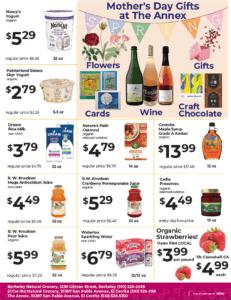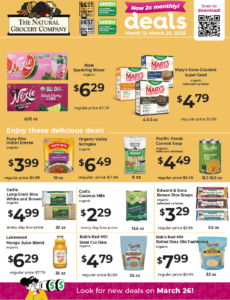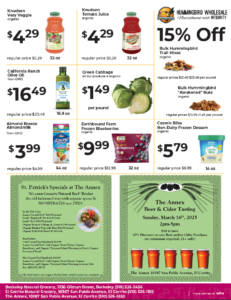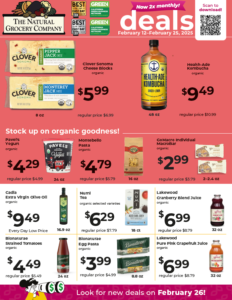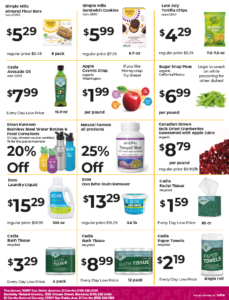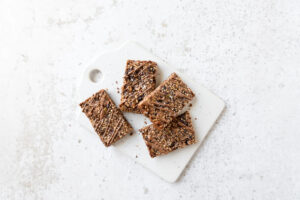June Sales Flyer B (6/11-6/24) (larger print)
Watermelon Jicama Salad Recipe
With watermelons just coming into season, it’s the perfect time to try out this refreshing Watermelon Jicama Salad recipe. It’s sweet, spicy, crisp, and everything you could want on a hot summers day. 🍉
Watermelon Jicama Salad
Serves 4-6
Total time: 25 minutes
Vegan, gluten-free, grain-free
3 pounds watermelon
1 ½ pounds jicama
2 scallions
Dressing:
1 tablespoon avocado oil
2 tablespoons fresh lime Juice
¼ teaspoon crushed red chilies
½ teaspoon ground cumin
¼ teaspoon sea salt
1 medium serrano pepper, seeded and minced
- Prepare salad ingredients. Peel and chop watermelon. Peel jicama and cut into matchsticks. Thinly slice scallions.
- Whisk together dressing ingredients, adjust heat to taste.
- Toss dressing with jicama and watermelon in a large bowl. Top with scallions and serve.
June 2025 Sales Flyer A (5/28-6/10)
June 2025 Sales Flyer A (5/28-6/10) (link to larger print)
May 2025 Sales Flyer B (5/14-5/27)
May 2025 Sales Flyer B (5/14-5/27) (larger print format)
May 2025 Sales Flyer A (4/30-5/13)
May Sales Flyer A 2025 (4/30-5/13) (Larger Print)
Nominations For Best Of El Cerrito 2025 Are Open!
🌟 Calling all El Cerrito friends, family, and neighbors! 🌟
The Natural Grocery Company is proud to be part of this amazing city, and we’d be honored to be recognized in the Best of El Cerrito 2025 awards!
If you love what we do, please consider nominating us by visiting the ballot link below. Whether it is for our Grocery Store or The Annex, please let us know if you like what we are doing!
Your support helps shine a spotlight on the people and businesses that make El Cerrito such a special place.
👉 https://www.elcerritochamber.org/best-of-ec
Let’s put El Cerrito on the map together! 💛
April 2025 Sales Flyer A (3/26-4/8)
April 2025 Sales Flyer A (3/26-4/8) (larger print)
March 2025 Sales Flyer B (3/12-3/25)
March 2025 Sales Flyer B (3/12-3/25) (larger print format)
February 2025 Sales Flyer B (February 12-25)
February 2025 Sales Flyer B (February 12-25) (larger print)
Chocolate Trail Mix Bars Recipe
These delicious chocolate trail mix bars are perfect whenever you’re on the go!
Plus, they’re made of pantry staples you probably already have on hand – including oats, peanut butter, and chocolate chips. And if you don’t have them on hand you know you can get them at our stores!
Chocolate Trail Mix Bars
Makes 8
Total time: 35 Minutes
Gluten-Free, Vegetarian
Ingredients
1 cup gluten-free rolled oats
½ cup trail mix
½ cup mixed roasted nuts, roughly chopped
⅓ cup chocolate chips
½ cup roasted sunflower seeds
¼ cup sesame seeds
¼ cup currants
½ cup honey or brown rice syrup
⅓ cup creamy peanut butter
2 ounces chocolate, chopped
¼ teaspoon avocado oil
Directions
- Preheat oven to 350° F. In a medium-size mixing bowl, combine oats, trail mix, nuts, chocolate chips, sunflower seeds, sesame seeds, and currants.
- Heat peanut butter and honey in a small saucepan and stir until bubbling. Pour over oat mixture and stir until well blended and everything is coated.
- Line a 9”x9” baking pan with parchment paper. Add mixture to the pan and with wet hands, press mixture flat.
- Bake for 15 minutes. Allow bars to cool before removing from the pan.
- Cut into eight bars and place on a cooling rack.
- Fill a medium-sized pot with two inches of water and place a heatproof metal or glass mixing bowl on top. You want it to fit snugly without touching the water. Bring the water to a simmer over medium-low heat. Add the chocolate and avocado oil to the bowl and stir until melted and combined. Drizzle the chocolate over the cooled bars.










